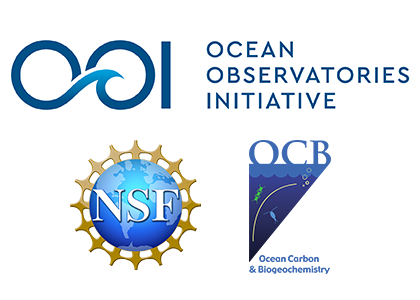The Ocean Observatories Initiative (OOI) Biogeochemical (BGC) Sensor Data Best Practices and User Guide is the result of an NSF-funded (OCE2033919) grass-roots community effort to broaden the use of OOI biogeochemical sensor data and increase community capacity to produce analysis-ready data products. The guide includes five chapters: The Introduction (Chapter 1) provides information on the OOI program, including data access, processing, and recommended end user QA/QC relevant to all OOI biogeochemical sensors, and Chapters 2-5 cover the following groups of BGC variables and associated sensors: Dissolved oxygen, nitrate, carbonate chemistry, and bio-optics.
This effort brought together an international group of 39 ocean observing experts, across all career stages, from 19 institutions and 5 countries, each of whom brings expertise on biogeochemical sensors, data analysis and ocean observing infrastructure, as well as research expertise in ocean biogeochemistry. The initial OOI Biogeochemical Sensor Data (OOI BGC) Working Group was formed in July 2021 through an open application process. A three-day virtual meeting in July 2021 launched the Working Group, with consensus-building activities to develop the scope and structure of the Best Practices and User Guide. From July 2021 to June 2022, the Working Group drafted a beta version of the Best Practices and User Guide that went through two rounds of internal review within the Working Group. A draft version of this document was Beta Tested by 14 current and prospective OOI BGC data users, who joined the Working Group members for a 3-day workshop in June 2022 to provide feedback that has since been used in revising and finalizing the document.
The OOI Biogeochemical Sensor Data Best Practices and User Guide is now complete, and has been submitted to the Ocean Best Practices System (OBPS). As a next step, we are seeking to gain GOOS endorsement of the document. In order to do so, the guide must undergo a rigorous community review process whereby comments are publicly invited and adjudicated. We now invite community members to review the guide and submit comments by February 28, 2023. After completing the open review, we will revise the document based on the reviewers’ comments and upload an updated, final version to OBPS.
We encourage feedback from everyone, including both disciplinary experts and users new to each of these sensor types, as well as both experienced and new users of OOI data. Reviewers are welcome to provide feedback on the entire document, or on chapters or sections that are of particular relevance to their interests or expertise.
How to review the OOI BGC Sensor Data Best Practices and User Guide:
We are aiming for a transparent and open community review process, and as such, all reviewer comments and responses to them will be public. We invite reviewers to provide feedback on the OOI Biogeochemical Sensor Data Best Practices and User Guide via two different pathways:
- Reviewers may comment directly into a Google Doc version of the guide in the form of comments added to the text. This will be most useful for comments or to suggest revisions on specific sections of the text. We request that reviewers sign in via Google or include their name and email in their comments so that we can identify and, if needed, follow up with individuals providing reviews.
Reviewers may submit lengthier and/or more overarching comments via an online form. All submissions to this form can be viewed here.





